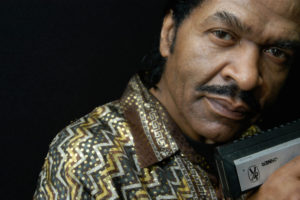Book Excerpt: ‘I Ain’t Studdin’ Ya’
By Bobby Rush
Mud, Walter, and Jimmy
After Big Joe Turner, the next person I saw at the Big Rec was Jimmy Reed. His performance had a profound effect on me. I had never heard a group that had Jimmy Reed’s band’s feel. There was a mysterious chemistry between the drummer, bassist, and guitarist. They were playing behind the beat—almost dragging—but it was still tight as a tick and hypnotizing. Ya couldn’t help but fall under the spell of that feel. A few years later, in 1957, you’d hear that vibe on one of his signature songs, “Honest I Do.”
But it cost me only 75 cents to change my life. ’Cause that was the ticket price to see Muddy Waters at the Big Rec. Little Walter was in his band. Muddy, with that moon face and twisted mouth, sang from the Rec stage like he was trying to tell me something. Raising his eyebrows high and low while he sang, he really let his band shine. Often he’d look at one of his musicians and say, “Play that thing, boy.”
With Little Walter blowin’ that harp right behind him, he gave praise up a lot. Like most young musicians, you learn by watching others. I soaked up every one of Muddy’s musicians that night. Going back and forth with my eyeballs, I was a sponge. And I would do a lot of soppin’ first time I saw Muddy Waters.
After seeing some greats perform at the Big Rec, my dreams felt possible. Because there they were, standing right in front of me. The greats came down to earth. What remained in outer space was recording and songwriting. I wanted to know more. And in my case, that was the basics. I started to listen to music, more like a doctor examining a patient. I checked out the lyrics. I learned what sets the verse apart from the hook, word-wise. I was figuring out what made great guitar riffs and the power of repetition that created a bass line. Still, I just kept putting my pennies together, working little jobs, and booking little gigs. From gig to gig I went, just trying to survive. This sounds crazy, but I didn’t know what I was doing—but somehow I knew what I was doing.
This was 1952, right before the dam burst with what would be the birth of rock ’n’ roll. But don’t get it twisted. As Ike Turner and a hundred other Negro musicians would soon say to me: that rock ’n’ roll is nothin’ but R&B.
